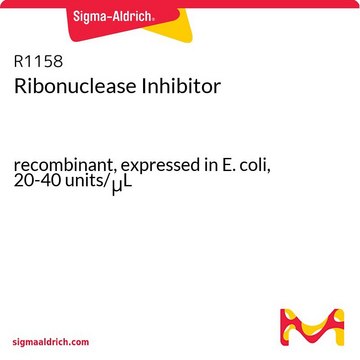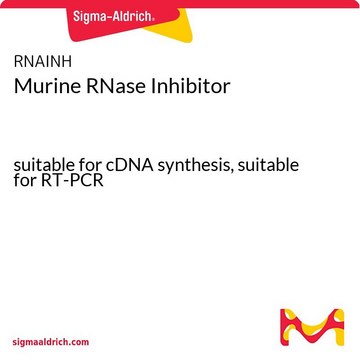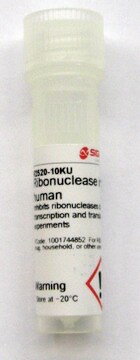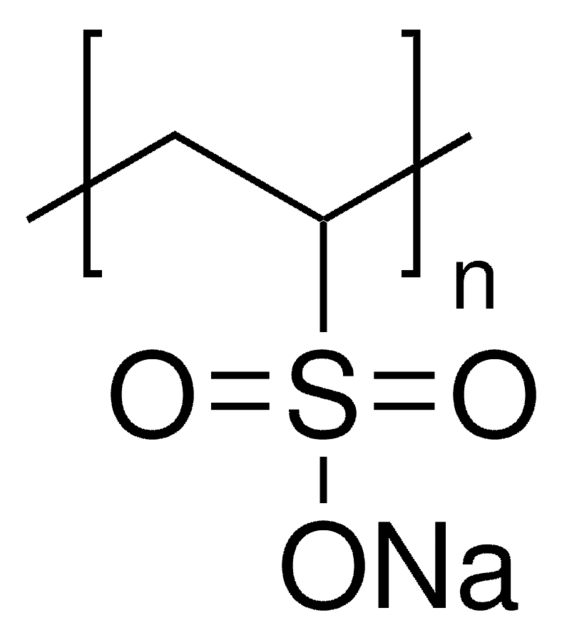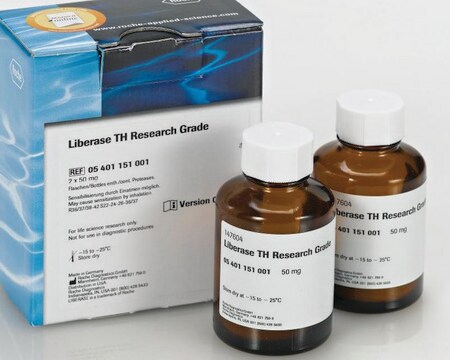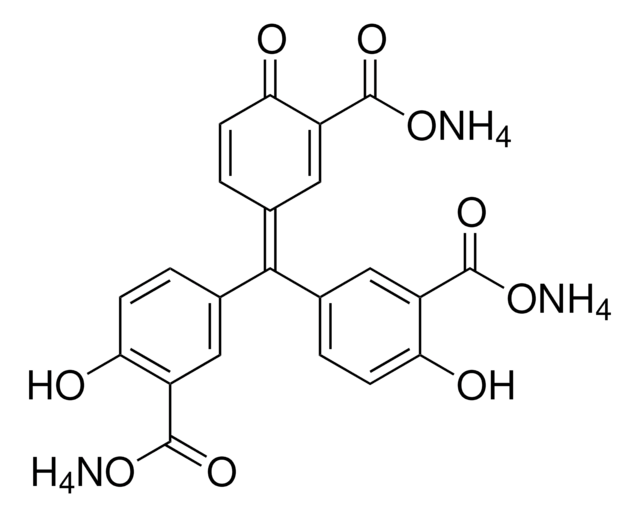R7397
ProtectRNA™ RNase Inhibitor 500× Concentrate
RNase inhibitor for in situ hybridization assays
Sinônimo(s):
Ribonuclease inhibitor ProtectRNA™
Faça loginpara ver os preços organizacionais e de contrato
About This Item
Código UNSPSC:
41106300
NACRES:
NA.52
Produtos recomendados
Descrição geral
Not recommended in systems where other enzymatic activity is required.
ProtectRNA™ ribonuclease(RNase) Inhibitor inhibits most nucleic acid binding enzymes such as RNase and DNase, reverse transcriptase, some RNA and DNA polymerases, protein synthesis enzymes, and several restriction endonucleases. In contrast, ProtectRNA does not interfere with DNA and RNA hybridizations. The action ofProtectRNA as a nuclease inhibitor can be used as an advantage for in situ hybridization. ProtectRNA is useful during all steps of in situ hybridization for tissue RNA protection from RNase degradation. It is recommended to add ProtectRNA to all aqueous solutions used, from as early as the deparaffinization step until the hybridization is completed.
ProtectRNA™ ribonuclease(RNase) Inhibitor inhibits most nucleic acid binding enzymes such as RNase and DNase, reverse transcriptase, some RNA and DNA polymerases, protein synthesis enzymes, and several restriction endonucleases. In contrast, ProtectRNA does not interfere with DNA and RNA hybridizations. The action ofProtectRNA as a nuclease inhibitor can be used as an advantage for in situ hybridization. ProtectRNA is useful during all steps of in situ hybridization for tissue RNA protection from RNase degradation. It is recommended to add ProtectRNA to all aqueous solutions used, from as early as the deparaffinization step until the hybridization is completed.
Aplicação
ProtectRNA™ RNase Inhibitor 500× Concentrate has been used in:
- RNA extraction
- tissue sectioning and staining for laser capture microscopy
- the isolation of blood vessels from hippocampi
ProtectRNA™ RNase Inhibitor 500× Concentrate is an RNase inhibitor.
A potent inhibitor of most nucleic acid binding enzymes, and thus useful as an RNase inhibitor. Especially useful when performing in situ hybridization. If it is added to all aqueous solutions used, it eliminates the need for special glassware washing and after-wash treatments. The 500x concentrate is economical; 2 ml treats 1,000 ml of solution. Not recommended in systems where other enzymatic activity is required.
Características e benefícios
- The 500× concentrate is economical
- Eliminates the need for special dishwashing and“after washing” cleaning and treatments.
Quantidade
2mL treats 1,000ml of solution.
Outras notas
This product is for R&D use only, not for drug, household, or other uses.
Informações legais
ProtectRNA is a trademark of Sigma-Aldrich Co. LLC
Palavra indicadora
Warning
Frases de perigo
Declarações de precaução
Classificações de perigo
Flam. Liq. 3 - Met. Corr. 1
Código de classe de armazenamento
3 - Flammable liquids
Classe de risco de água (WGK)
WGK 2
Ponto de fulgor (°F)
140.0 °F - closed cup
Ponto de fulgor (°C)
60 °C - closed cup
Certificados de análise (COA)
Busque Certificados de análise (COA) digitando o Número do Lote do produto. Os números de lote e remessa podem ser encontrados no rótulo de um produto após a palavra “Lot” ou “Batch”.
Já possui este produto?
Encontre a documentação dos produtos que você adquiriu recentemente na biblioteca de documentos.
Os clientes também visualizaram
Exposing the Three-Dimensional Biogeography and Metabolic States of Pathogens in Cystic Fibrosis Sputum via Hydrogel Embedding, Clearing, and rRNA Labeling.
DePas WH
mBio, 7(5), e00796-e00716 (2016)
Gene expression analysis of interferon kappa in laser capture microdissected cervical epithelium.
DeCarlo CA
Analytical Biochemistry, 381(1), 59-66 (2008)
Recovery of high-quality RNA from laser capture microdissected human and rodent pancreas.
Butler AE
Journal of Histotechnology, 39(2), 59-65 (2016)
Beatrice Quevedo et al.
BMC microbiology, 11, 14-14 (2011-01-21)
The purpose of this study was to design and evaluate fluorescent in situ hybridization (FISH) probes for the single-cell detection and enumeration of lactic acid bacteria, in particular organisms belonging to the major phylogenetic groups and species of oral lactobacilli
David Greenwood et al.
Proteomics. Clinical applications, 14(3), e2000011-e2000011 (2020-03-31)
Periodontitis is linked to a localized dysbiotic microbial shift. This trending may often not be evident due to deep taxonomic changes of low abundance organisms and lack of consideration of variations in the treatment response. By using next generation sequencing
Nossa equipe de cientistas tem experiência em todas as áreas de pesquisa, incluindo Life Sciences, ciência de materiais, síntese química, cromatografia, química analítica e muitas outras.
Entre em contato com a assistência técnica
